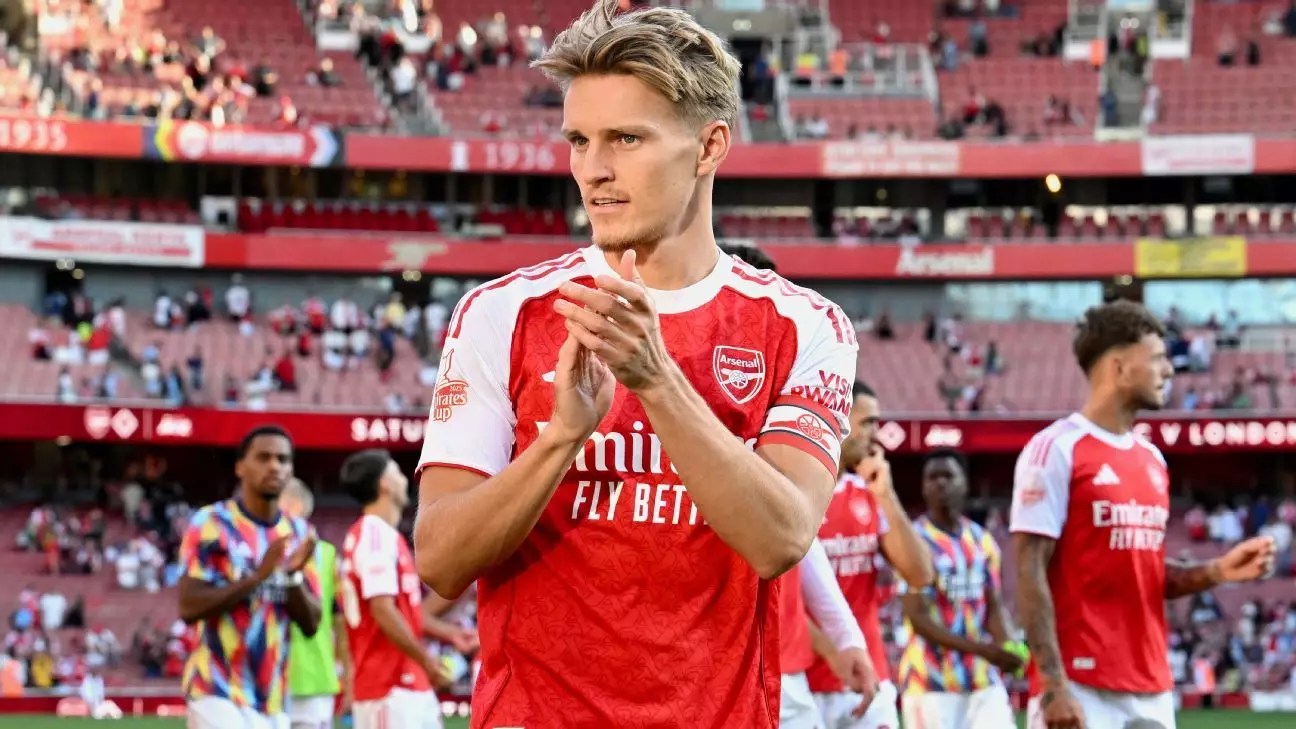In an era where team dynamics can be clouded by external opinions and media noise, Arsenal’s manager Mikel Arteta demonstrates a commendable example of leadership integrity and trust in his players’ voice. His public defense of Martin Ødegaard’s captaincy not only highlights his confidence in the Norwegian midfielder but also underscores a broader philosophy: leadership within a team should be rooted in collective respect and genuine endorsement, rather than external opinion or speculation.
The controversy sparked by former Arsenal captain Tony Adams, who questioned Ødegaard’s suitability as captain, revealed a fascinating divide: seasoned football legends often emphasize experience and pedigree, yet team cohesion and self-perception are equally vital. Arteta’s decisive move—anchored in a transparent voting process—serves as a critique to traditionalist views that may prioritize seniority over current influence. His insistence that the squad overwhelmingly supports Ødegaard shows a team that values internal consensus above external chatter, fostering a culture of mutual respect and empowerment. It’s an approach that breeds resilience; when players have a voice in leadership decisions, they are more likely to carry that responsibility with conviction.
Furthermore, it is worth examining the significance of this unanimous support. In sporting environments governed by high-pressure situations, ambiguity in leadership can erode confidence. Arteta’s decision—and the squad’s backing—reinforces that leadership must be earned, not assumed. The captaincy, in this context, transcends mere symbolism. It becomes a demonstration of trust, unity, and shared ambition. Arsenal’s team ethos appears to be founded on the principle that the best leader is the one the players believe will drive success; this internal alignment can often be more impactful than external perceptions of experience or reputation.
Challenging Conventional Wisdom in Football Leadership
Tony Adams’ critique, suggesting that Arsenal “are not going to win the league with Ødegaard as captain,” reflects a traditional view rooted in experience and status. Yet, Arteta’s stance challenges this notion, emphasizing that leadership efficacy is better measured through performance, belief, and collective endorsement rather than pedigree alone. This perspective shifts the paradigm: leadership is a dynamic, evolving quality that must resonate with the current team’s needs rather than outdated standards.
The manager’s emphasis on the voting process indicates an understanding that leadership is multifaceted and must adapt to the context. The departure of senior figures like Jorginho provided an opportunity to reshape the leadership group, and rather than default to convention, Arteta allowed the squad to decide who they felt best represented them. This move signals a broader shift away from autocratic leadership models toward more inclusive, democratic team cultures—an approach increasingly relevant in modern sports and workplaces alike.
Additionally, the importance of player morale and cohesion cannot be overstated. When players have ownership of their leadership structure, they are more committed, motivated, and cohesive. The trust placed in Ødegaard’s leadership is a testament to that philosophy. Arteta’s decision amplifies the message that leadership should reflect internal realities rather than external expectations, paving the way for a more resilient and self-reliant squad.
Leadership Beyond the Pitch: Navigating Rules and Respect
While the debate over captaincy captures much attention, Arteta’s comments on game regulation reveal his strategic mindset. His recognition of the league’s efforts to clamp down on time-wasting and misconduct echoes his broader philosophy of discipline and respect within the game. His understanding that rule enforcement impacts the flow and fairness of matches is insightful, and his proactive stance in addressing these issues demonstrates his leadership extends beyond players— shaping a culture of professionalism.
Moreover, Arteta’s references to cooperative dialogues with referees and league authorities reveal his understanding that effective leadership involves negotiation and advocacy. Recognizing the importance of consistent application of rules is crucial, especially in a competitive league striving for integrity and entertainment. His optimism about the league’s future and belief in collective effort reinforce the idea that leadership is also about fostering cooperation among all stakeholders—players, officials, and administrators.
In placing emphasis on adapting to rule changes and expecting higher standards, Arteta portrays himself not just as a tactician but as a diplomat and a unifier. His focus on continuous improvement suggests a philosophy that values growth, transparency, and fairness—attributes that resonate deeply with a team seeking sustained success at the highest level.
Mikel Arteta’s stance exemplifies a progressive approach to leadership—based on authenticity, team consensus, and adaptability. His unwavering support for Ødegaard, validated by the players’ collective voice, reinforces that leadership must be rooted in trust and mutual respect. In a sport where external opinions are relentless, his decisions highlight that true influence comes from empowering one’s squad and fostering genuine belief.
By openly addressing rule enforcement and advocating for a culture of professionalism, Arteta demonstrates that leadership is multifaceted. It involves not only guiding the team on the pitch but also shaping an environment where fairness, discipline, and cohesion thrive. This comprehensive perspective on leadership positions Arsenal not merely as title contenders but as a club committed to modern, values-driven excellence.


Leave a Reply